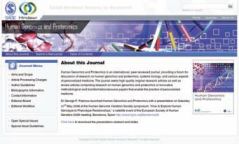Journal unites research articles with raw data
SAGE-Hindawi has launched its first journal and it has a close link to the raw research data, as Siân Harris finds out

When Hindawi and SAGE formed a partnership at the end of last year both publishers were venturing into new territory. For Egypt-based Hindawi it was an opportunity to work with a much larger publishing company with all the editorial and marketing resources that it commands and to expand into new subject areas. For SAGE, the move was probably more radical: it signalled SAGE’s first venture into open-access publishing.
Half a year on, the first fruit of this partnership has been announced. SAGEHindawi’s first journal, Human Genomics and Proteomics, is now accepting submissions and, according to David Ross, SAGE’s business development manager, should have its first open-access papers online within the next few months.
According to the joint publisher, the journal intends to provide a forum for the discussion of research on human genomics and proteomics, systems biology and various aspects of personalised medicine.
The choice of topic for this launch was partly strategic, according to Ross. ‘The gold open-access model is already a proven business model in the genomics field,’ he pointed out. ‘There are obviously many unknowns about open access but more of these have been answered in genomics than in other disciplines. This means that we can concentrate on other factors such as the price/quality mix.’
However, there was also some serendipity in the specific choice of topic for the journal. ‘We put out feelers to our editorial contacts and George Patrinos of Erasmus MC in the Netherlands and Emanuel Petricoin of George Mason University, USA (the editors-in-chief of the new journal) came to us with this idea,’ he said.
The idea that Patrinos and Petricoin brought to the company was unusual in more than its topic, or that it is the first launch from SAGE-Hindawi. The editors-in-chief also came up with the suggestion of the new title being affiliated with a database. Patrinos is one of the team behind FINDbase: the National/Ethnic Mutation Database, which documents frequencies of causative mutations leading to inherited disorders in various populations worldwide, and wanted to see whether an online-only open-access journal could be linked with this database.
SAGE-Hindawi liked the idea: ‘We keep hearing, as publishers, that open data is going to be the next big development. With the internet we can now disseminate the datasets that underpin articles and in genomics there is a willingness to share data,’ explained Ross.
Despite this enthusiasm for researchers to share data, however, it is still a pretty new idea. ‘Everyone talks about open data but it is very much individual research groups sharing data at the moment,’ observed Ross. FINDbase is no exception to this. It was launched at the end of 2006 with the aims of providing a freelyavailable and extendable system for population-based mutation data collection.
However, its coverage is not yet anywhere near comprehensive in this area. ‘At the moment only a handful of research groups use the database in meaningful way,’ said Ross. ‘We hope it will become the main repository in this area.’
From the launch of FINDbase, the idea of a ‘database-journal’ was in the minds of its creators. George Patrinos explained to delegates at a satellite event of the European Society of Human Genetics 2008 meeting in Barcelona, Spain in May that this was the reason for providing a direct online submission tool for adding mutation frequency data to FINDbase.
So how will the affiliation between FINDbase and the new journal work? Already, datasets submitted for inclusion in FINDbase are peer-reviewed. The FINDbase board have a series of selection criteria to determine whether a dataset is representative, large enough and has had proper evaluation and analysis.
With the launch of Human Genomics and Proteomics, authors of accepted datasets will be asked to write an abstract for inclusion in the journal. The journal will have a dedicated section for these abstracts, called FINDbase datasets, and these will also be peer reviewed. In addition, provided that the new journal is accepted by PubMed/Medline, the data will also be published against a PubMed ID.
‘This publication modality can not only provide the proof of principle for closely related efforts but also serve as a nonprofit model for sustainable database funding,’ concluded George Patrinos in his Barcelona presentation. ‘We don’t have any claim to what goes on in the database,’ said Ross, ‘but we hope that people would want to publish alongside their dataset.’ Despite this database tie-up, however, the journal is launching with the traditional type of journal articles, albeit with the authorpays model. ‘I’m not envisaging that we’ll start to publish abstracts of datasets straight away,’ said Ross. ‘The first papers will be primary research papers.’
The journal is only available online, from the SAGE-Hindawi platform. Publishing an article in Human Genomics and Proteomics requires an article processing charge of £700.






